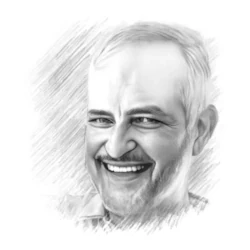The Gulag
© J. Francois Barnard – 1 February 2024
Tatiana shouted for help as they dragged her away from her aunt's house. Nobody dared to help her and stand up against the militsiya. That she acted in self-defence did not matter. She shot an officer who assaulted her, and her destiny was the Gulag Camp, Perm 36.
 It was only on arrival that she learned that her sentence was 15 years of forced labour. There was no trial and no lawyer to represent her. It was a default judgment for a woman who dared to stand up for her rights.
It was only on arrival that she learned that her sentence was 15 years of forced labour. There was no trial and no lawyer to represent her. It was a default judgment for a woman who dared to stand up for her rights.
She quickly fell into the strict routine of camp life. Wake up at 6 am, eat breakfast by 6:30, attend roll call at 7 am. By 7:30, they all marched for 1½ hours to the forest under a guarded escort. They would work all day and, at 6 pm, marched back to the camp. By 7:30 pm, it was time for dinner, and at 8 pm, they attended after-dinner duties like chopping firewood, shovelling snow, gardening, repairing roads, etc. Lights out came at 11 pm.
The food was a thin soup known as balanda, and sometimes, the chefs added black bread to it. The boiled soya was heavy and drifted down to the bottom. Tatiana soon learned that those in the front of the row got thin soup, and those further back got more substance. Her mother's kitchen became a distant memory, and she said to herself that she could not even remember what meat would taste like.
While they could wash their faces every morning, prisoners could only shower once every two weeks. Taking a shower was humiliating because the guards would enter their barracks and order everyone to strip down naked. Then they would run naked through the snow to the bathroom, where each had a few minutes in lukewarm water to wash away two weeks' dirt. Then they would walk past a guard who would spray disinfectant and a delicing solution all over them.
Being raped by the guards was also a routine, and Tatiana fell pregnant five times. But none of her offspring survived for longer than five or seven weeks. Hard labour and little food caused them to abort. Other mothers carried their babies for the entire term, and then the Russian authorities would take them away to an orphanage. She saw how the mothers would cry over their children and thought it better that hers died prematurely.
In her fifth year in the Gulag, Tatiana woke one morning when someone shouted: "Mirror!" Nobody knew who carried the mirror into their barracks and placed it against the wall. Twenty or more of them gathered around the full-length mirror and saw unrecognisable faces staring back at them. Tatiana lifted her hand slowly to touch her face and noticed how someone resembling her mother did the same.
"Mama!" she cried, and pandemonium broke loose. Some cried, some laughed, and others were enraged. Not long afterwards, a woman filled with bitter anger smashed the mirror to pieces. "Do not torture me with how I look!" she shouted. They quickly cleaned up the mess and had breakfast.
Nobody talked about the mirror again, but all of them were aware of how much they changed over the years. Tatiana kept a small piece of the broken mirror at her bedside. She would look at her mother's face and say: "Mama, I want to go home."
I was in her seventh year when a guard told her not to fall in line to march off to the forest. Tatiana feared the worst, but to her surprise, the guard took her through an administrative process, gave her new clothes to wear and handed her over to an escort who would travel with her per train back to St Petersburg. Tatiana arrived home in time for her 25th birthday.
Editor's note: The above story was the result of an assignment done in the Creative Writing course, Section The Craft of Style, at Wesleyan University.
Contact me






